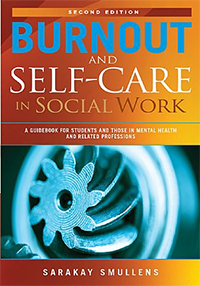
SaraKay Smullens, LCSW, ACSW, BCD, CGP, CFLE, has had a multifaceted career in social work. Upon her return to working with families suffering from neglect and abuse, she learned that mentors she had relied on earlier were leaving the field. They said they were “burned the hell out,” and identified the cause as “professional burnout.”
The year was 2005.
“At that time, burnout was not the household word it is today,” said Smullens. “I had never heard the term before, had no understanding of what it meant or its differences from depression. I immediately began research, starting to present findings in 2010.”
Through this work, she realized that burnout can originate personally, professionally, in relationships, and physically. She identified the causes of burnout, and the easily recognized signs and signals that burnout is in the wings or that it has already arrived.
Smullens published the first edition of “Burnout and Self-Care in Social Work" in 2015. It became a best-seller.
“I learned that students recommended the book to their professors and to their supervisors,” she said. “I also learned that professionals who were not social workers — teachers, lawyers, doctors, school counselors, moms, volunteer professionals, etc. — found the book’s content and explanations relevant in their own lives.”
The author, whose private and pro bono clinical social work practice is in Philadelphia, has just published her second edition of Burnout and Self-Care in Social Work, available at NASW Press. This edition integrates an explanation of a fifth arena — “societal burnout” — which Smullens describes as the impact of long-simmering, unaddressed, dangerous societal issues in people’s lives.
Evidence-based, self-care approaches to alleviate and prevent burnout are described for each of the five arenas, as are the differences between burnout and depression.
Attention also is given to psychosocial developmental factors in the life of each child, as well as the impact of both moral distress and dysfunctional leadership in our personal, relational, professional and societal-political worlds.
To find NASW Press publications in print and electronic format, visit NASWPress.org.